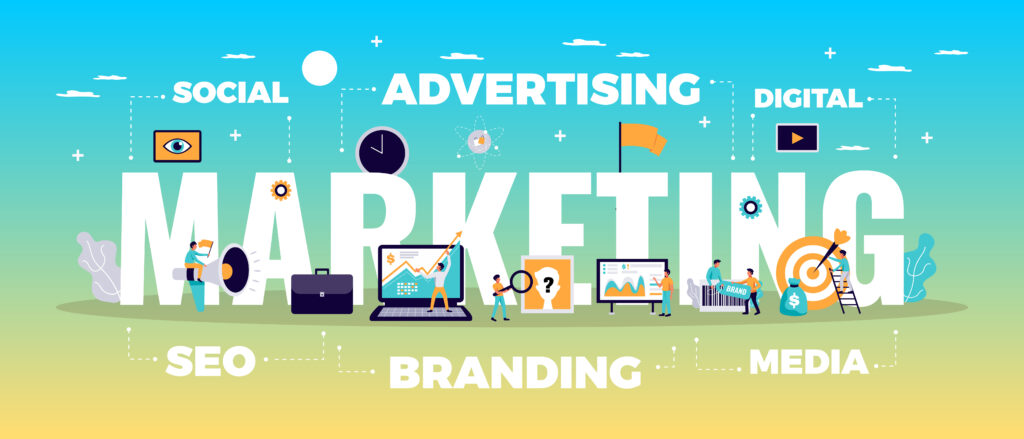
Introduction:
In the fast-paced digital era, businesses are constantly adapting to new trends to stay ahead in the competitive landscape. Digital marketing has emerged as a game-changer, revolutionizing the way companies promote their products and connect with their target audience. In this comprehensive guide, we’ll delve into the essence of digital marketing, exploring its various facets and shedding light on the keywords that can elevate your understanding and optimize your online presence.
What is Digital Marketing?
Digital marketing encompasses a broad spectrum of online strategies and techniques designed to reach and engage a target audience through digital channels. These channels include search engines, social media platforms, email, websites, and other online avenues. The primary goal of digital marketing is to build brand awareness, drive traffic, generate leads, and ultimately convert prospects into customers.
Search Engine Optimization (SEO):
SEO is the practice of optimizing a website to improve its visibility on search engines like Google. This involves various strategies, including keyword research, on-page optimization, backlink building, and technical SEO. The goal is to rank higher in search engine results pages (SERPs) to attract organic (non-paid) traffic.
Social Media Marketing (SMM):
SMM involves using social media platforms such as Facebook, Instagram, Twitter, and LinkedIn to connect with the target audience. Businesses create and share content to engage users, build a community, and drive traffic to their websites. Paid advertising options on social media platforms also play a crucial role in reaching a broader audience.
Content Marketing:
Content marketing focuses on creating and distributing valuable, relevant, and consistent content to attract and retain a specific audience. This can include blog posts, articles, videos, infographics, and more. The goal is to establish the brand as an authority in its industry and provide value to the audience, ultimately leading to customer loyalty and trust.
Email Marketing:
Email marketing involves sending targeted messages to a group of people via email. It is a powerful tool for building and maintaining customer relationships, nurturing leads, and promoting products or services. Email campaigns can include newsletters, product updates, promotional offers, and personalized content.
Pay-Per-Click (PPC):
PPC is a model of Internet marketing where advertisers pay a fee each time their ad is clicked. It’s a way to buy visits to a website rather than earning them organically. Google Ads is a popular PPC platform, allowing businesses to bid on keywords relevant to their products or services and display ads to users searching for those keywords.
Digital Analytics:
Digital analytics involves the collection, measurement, analysis, and interpretation of digital data to understand user behavior and optimize digital marketing efforts. Tools like Google Analytics provide insights into website traffic, user demographics, and conversion rates. Analyzing these metrics helps marketers make informed decisions and refine their strategies.
Influencer Marketing:
Influencer marketing leverages individuals with a significant following on social media to promote products or services. These influencers, often experts or celebrities in their niche, can sway the purchasing decisions of their followers. Brands collaborate with influencers for authentic endorsements and to tap into their audience for increased brand visibility.
Mobile Marketing:
With the increasing use of smartphones, mobile marketing focuses on reaching the target audience on their mobile devices. This includes mobile-optimized websites, mobile apps, SMS marketing, and location-based services. Mobile marketing ensures a seamless and engaging experience for users on their smartphones and tablets.
Conversion Rate Optimization (CRO):
CRO is the process of optimizing a website or landing page to increase the percentage of visitors who take a desired action, such as making a purchase or filling out a form. This involves analyzing user behavior, conducting A/B testing, and making improvements to enhance the overall user experience and, consequently, conversion rates.
By understanding and implementing these digital marketing strategies, businesses can create a holistic and effective online presence, reaching their target audience and achieving their marketing objectives. In conclusion, digital marketing is a dynamic and ever-evolving field that empowers businesses to thrive in the digital age. By understanding and implementing the key strategies mentioned above, you can position your brand for success in the online realm. Stay updated on the latest trends, embrace innovation, and watch your digital presence soar to new heights.
Remember, the digital marketing landscape is vast, so stay curious, stay informed, and adapt to the changing digital dynamics for sustained success.

